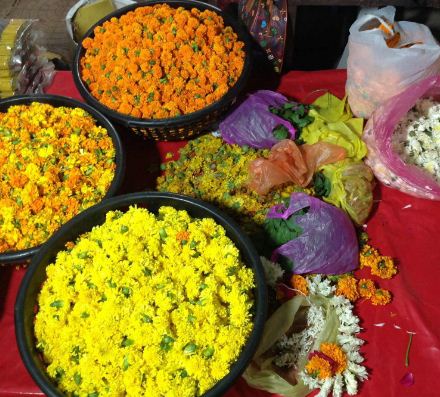As India moves towards sustainability and a circular economy, the focus on waste to wealth is the way to be…reports Asian Lite News
The floral waste sector in India is experiencing new growth, marked by its multifaceted benefits. Not only is it providing meaningful employment opportunities for women, but is also effectively diverting waste from dumpsites, contributing to environmental preservation.
As India moves towards sustainability and a circular economy, the focus on waste to wealth is the way to be.
The circular economy is a model of production and consumption that involves sharing, leasing, reusing, repairing, refurbishing and recycling existing materials and products as long as possible. In this way, the life cycle of products is extended.
Implementing composting pits in temples and involving temple trusts and SHGs in recycling efforts can create significant employment opportunities. Outreach programs to educate priests and devotees about not dumping floral waste in rivers can help encourage waste reduction.
The “Green Temples” concept can be integrated into policies to transform temples into eco-friendly spaces. Promoting digital offerings or biodegradable materials instead of traditional flowers can also help reduce floral waste.
The National Horticulture Board can be involved in tracking and managing floral waste in green spaces like parks.
Floral waste, collected from the spiritual sites mostly biodegradable, often ends up in landfills or water bodies, causing health hazards and harming aquatic life.
According to a UN Climate Change report, the river Ganga alone absorbs over 8 million MT of flower waste annually. Under the Swachh Bharat Mission-Urban 2.0, several Indian cities are bringing innovative solutions to the table. Social entrepreneurs are stepping in to recycle flowers into valuable products like organic compost, soaps, candles, and incense sticks.
With 75,000 to 100,000 daily visitors at the Ujjain’s Mahalakaleshwar Temple, around 5-6 tonnes of floral and other waste are produced daily. Specialized ‘Pushpanjali Econirmit’ vehicles collect this waste and then it is processed at a 3TPD plant, turning it into eco-friendly products.
Sixteen women from the Shiv Arpan Self-Help Group create various high-quality items from the floral waste and have been employed for the same.
Additionally, the waste is converted into briquettes and compost, for the local farmers and as also works as biofuel. According to the Ujjain Smart City 2022 report, 2,200 tons of floral waste has been treated to date, and a total of 30,250,000 sticks produced so far.
Siddhivinayak Temple sees nearly 40,000 -50,000 devotees daily peaking 1,00,000 devotees on some given days, offering 120 to 200kgs of floral.
Mumbai-based designer house ‘Adiv Pure Nature’ has initiated a sustainable venture, turning the temple’s discarded blooms into natural dyes to create different textiles in the form of fabric yardage, garments, scarves, table linens and tote bags.

They collect floral waste thrice in a week which accounts to 1000-1500 kg /week. After segregation, a team of artisans transform the dried flowers into natural dyes.
Beyond the commonly used marigold, rose, and hibiscus, the team also utilizes coconut husks to create natural dyes and produce textured prints through steam.
Tirupati Municipal Corporation handles over six tons of floral waste daily from temples every day. The city collects and upcycles floral waste into valuable and reusable products.
150 women from self-help groups have been employed through this. The recycling is done at the Tirumala Tirupati Devasthanam Aggarbatti 15-ton capacity manufacturing plant. The products are packaged with recycled paper and plantable paper embedded with Tulsi seeds for a zero-carbon footprint.
Kanpur based Phool, the floral waste recyclers have been tackling the massive temple-waste problem by collecting floral-waste from temples from various cities on a daily basis.
Phool collects nearly 21 MT of floral-waste weekly (3 TPD) across the five prominent temple towns of India including Ayodhya, Varanasi, Bodh Gaya, Kanpur and Badrinath.
This waste is upcycled into items such as incense sticks, incense cones, Bamboo-less incense, havan cup etc. The women employed by Phool enjoy a safe working space, fixed salaries, and benefits like provident fund, transportation, and healthcare.
Hyderabad-based startup, ‘HolyWaste’ has revitalized floral waste through a unique process called ‘Florjuvination. Founded in 2018, the company’s founders Maya Vivek and Manu Dalmia partnered with vendors, temples, event organizers, decorators, and flower waste generators.
They collect floral waste from 40 temples, 2 flower vendors, and a market area to create eco-friendly products like fertilizers, incense sticks, scented cones, and soaps. Currently, Holy waste is preventing a humble quantity of 1,000 kgs/week from clogging the water bodies or rotting in the landfills.
Poonam Sehrawat’s startup, ‘Aaruhi’, collects floral waste from over 15 temples in Delhi-NCR, recycling 1,000 kg of waste and earning over Rs 2 lakh monthly. Sehrawat has trained more than 3,000 women to create products from floral waste. (ANI)
ALSO READ: DMCC briefs WTO on Future of Trade Report














